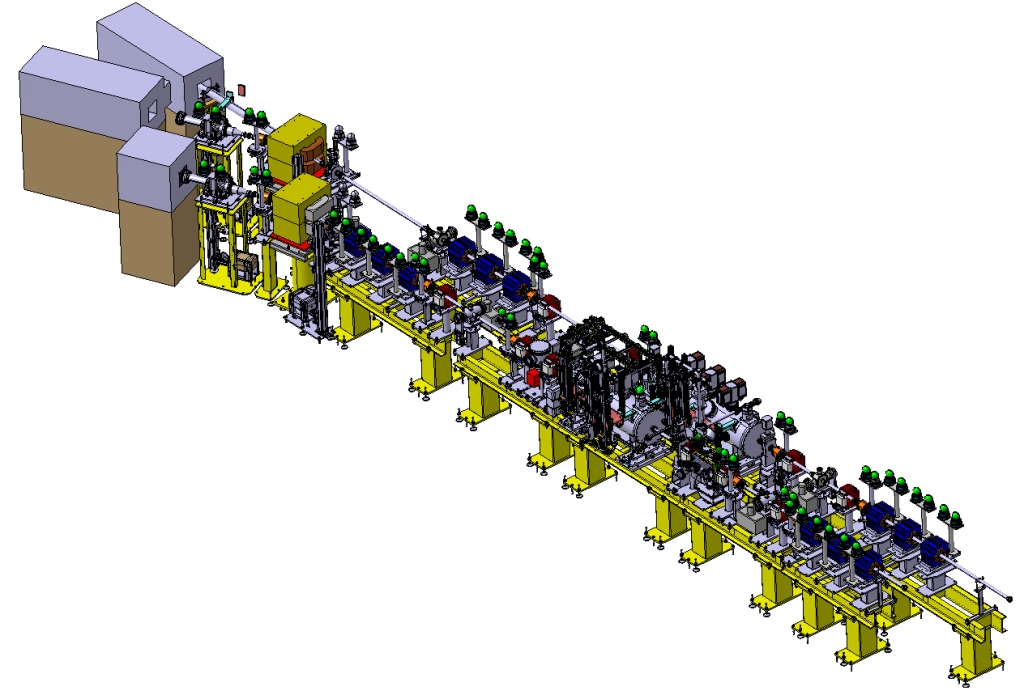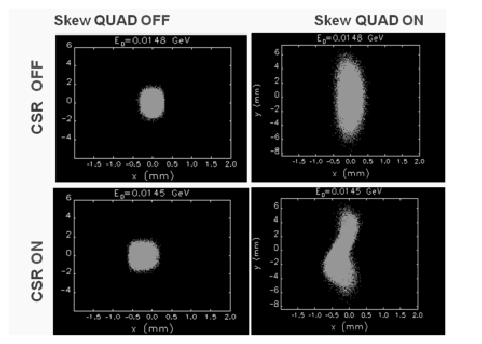I could write about how I made a really nice ratatouille yesterday and about how I plan to make a mayonnaise chocolate cake with sticky, condensed milk icing today,… but I would prefer to get back to some more thoughtful, academic content. It is also comforting, in its own way.

Here goes:
My professional experience was in accelerator physics — a discipline which is primarily applied particle physics and RF engineering. Laser physics has played an increased role in the field in recent years, but the newcomer that is making the biggest splash today is artificial intelligence. Young people who have taken classes in artificial intelligence, Kalman filters, machine learning, data science, and self-driving cars are hired by accelelerator facilities and they sell their schemes for improving operations that have traditionally been done by hand.

Accelerator physicists have been trained in classical physics to operate machines that require both a systematic approach to simulating particle dynamics and the development of intuition about how the engineering subsystems depend on one another. While some accelerator physicists greet these data science newcomers with great enthusiasm and optimism, others look at their techniques and say,
“We tried to automate that ten years ago and it didn’t work because of x, y, and z.”
They know that sometimes greater automation just makes the system harder to untangle as feedback loops fail in a cascade of automated chaos.
Perhaps the old-timers’ scepticism comes from knowledge that developing a concept for an artificial intelligence controller takes all of ten minutes, but dealing with all of the exception handling and failure modes takes ten years or ten lifetimes in some cases. They may have read The Mythical Man-Month – a book about how software projects’ personnel requirements scale exponentially if you do not structure them properly.
They also may wonder why we should automate systems that are designed to teach people about how to operate and construct complex systems. If the automation hides how the system works, what is the student learning? To trust in blind automation?
What I understand is that because there is presently such a huge influx into anything called ‘artificial intelligence’, you will find many people who rebrand themselves and repackage old ideas as the latest and greatest thing.
Consider this machine learning jargon:
Any tunable unsupervised machine learning solver uses transfer learning to some extent, sometimes implicitly in the form of hyperparameters or preprocessing of inputs.
I’m pretty sure that there are older, clearer ways to say the same thing and that complex, specialized sub-discipline syntax is a form of laziness that frequently hides simple errors.
I’m also pretty sure that many funding agencies have forgotten the danger of over-subsidizing a field.

Sometimes, the older, more experienced voices can get drowned out by the young, enthusiastic newcomers.
There is also the danger that when people who have valuable expertise get distracted by what seems to be newer and better, valuable knowledge can be lost because it is not passed on to the next generation.
In accelerator physics, for example, there is the skill of crafting particle tracking simulations from scratch and many of the younger people in the discipline only get a cursory instruction in these techniques before falling back on simulation software packages written by others. In this way, real intelligence may be replaced with an inferior form of artificial intelligence.
When I was working in the field, I wrote my own particle tracking simulations and began to see the limitations of the software packages that were being used by everyone else, but I found it difficult to get people to trust my results because they preferred to trust the more established codes.

It was this strange situation that inspired me to write a satirical novel about a machine that tricked the users into an illusion of comprehension of a system over which they had long since lost control.
When I exited the field of accelerator physics and began to study what was going on in the wider world and in the wider world of physics education, I saw how compartmentalized and narrow many forms of academic instruction had become. I wondered if this had always been the case or if the internet was changing how people learn and process information. My question became:
How is artificial intelligence affecting our real intelligence?
As I explored online question and answer sites like Quora, on which various artificial intelligences fed me questions to keep me churning out more free content for their system, I began to get a sense of the extent and limitations of my knowledge base. I was surprised to find that I was often the only person who remembered certain stories that were told in my physics classrooms twenty years ago. How could this be? How could it be that my education was so different from that of this community? This made me worry that the internet had done something to people – changing what they remember, perhaps. I worried that there is an oral tradition which is in danger of being lost as we outsource our mental processes to Google and the various forms of online artificial intelligence. I wondered – if you remember keywords instead of stories, how does your brain change? What is lost and what is gained?
I think we can preserve what needs to be preserved without losing the advantages of the computing age if we preserve enclaves of silence. Libraries, monasteries, and offices have served this purpose in the past, but in our present age of open office floor plans and constant attachment to email, the spaces for uninterrupted thought are few and far between. In the future, the difference between a person who can think independently and a person who can only operate according to conditioning produced by a stupid algorithm may be dependent on how well their parents and schools were able to protect them from noise. This may be the difference between a person with real intelligence and a person with artificial intelligence.
I believe Nassim Taleb called these people, “intellectual yet idiots”. Another writer described these products of our most elite universities as, “excellent sheep” who are incapable of true thought.
Those excellent sheep who are developing addictive toys and tools with artificial intelligence need to be aware of how those tools can be used for good or evil. They may pull a person out of the depths of depression and inactivity by giving him or her the illusion of purpose. They may also pull a person into a spiral of pointless, repetitive clicking. Whenever someone designs a tool that ensares an unsuspecting human into a spiral of self-reinforcing feedback, the designer must have a vision beyond the initial trap. They must know where they are leading that person and understand how that path fits into a larger purpose.
Ultimately, we know where our paths lead. We run, we rest, we die, and pass the torch on to the next person. The thing that makes artificial intelligence unique is that it does not get tired, rest, or die. It is crystallized within our institutions and it may evolve as we make choices. It may also evolve as it makes choices.
What is kind for one individual may be cruel for another and when we seek to control tools that have an almost godlike power, we may feel forced to fill roles that were not meant for us. When we create tools that hold us hostage in the kindest possible way, we are reminded of something old and true, “Nobody moves and nobody gets hurt.’
But hasn’t it always been this way?
This pandemic is our chance to stop moving and take stock of our frantic pursuit of progress. We shouldn’t waste it.
I think that keeping people running on a hamster wheel and chasing after the illusion of progress is cruel and this is not a new sentiment. There was a nice, short story written back in 1911 about this called The Other Side of the Hedge by E.M. Forster. Since it isn’t very long, I will paste it below:

MY PEDOMETER TOLD me that I was twenty-five; and, though it is a shocking thing to stop walking, I was so tired that I sat down on a milestone to rest. People outstripped me, jeering as they did so, but I was too apathetic to feel resentful, and even when Miss Eliza Dimbleby, the great educationist, swept past, exhorting me to persevere, I only smiled and raised my hat.
At first I thought I was going to be like my brother, whom I had had to leave by the roadside a year or two round the corner. He had wasted his breath on singing, and his strength on helping others. But I had travelled more wisely, and now it was only the monotony of the highway that oppressed me—dust under foot and brown crackling hedges on either side, ever since I could remember.
And I had already dropped several things—indeed, the road behind was strewn with the things we all had dropped; and the white dust was settling down on them, so that already they looked no better than stones. My muscles were so weary that I could not even bear the weight of those things I still carried. I slid off the milestone into the road, and lay there prostrate, with my face to the great parched hedge, praying that I might give up.
A little puff of air revived me. It seemed to come from the hedge; and, when I opened my eyes, there was a glint of light through the tangle of boughs and dead leaves. The hedge could not be as thick as usual. In my weak, morbid state, I longed to force my way in, and see what was on the other side. No one was in sight, or I should not have dared to try. For we of the road do not admit in conversation that there is another side at all.
I yielded to the temptation, saying to myself that I would come back in a minute. The thorns scratched my face, and I had to use my arms as a shield, depending on my feet alone to push me forward. Halfway through I would have gone back, for in the passage all the things I was carrying were scraped off me, and my clothes were torn. But I was so wedged that return was impossible, and I had to wriggle blindly forward, expecting every moment that my strength would fail me, and that I should perish in the undergrowth.
Suddenly cold water closed round my head, and I seemed sinking down for ever. I had fallen out of the hedge into a deep pool. I rose to the surface at last, crying for help, and I heard someone on the opposite bank laugh and say: “Another!” And then I was twitched out and laid panting on the dry ground.
Even when the water was out of my eyes, I was still dazed, for I had never been in so large a space, nor seen such grass and sunshine. The blue sky was no longer a strip, and beneath it the earth had risen grandly into hills—clean, bare buttresses, with beech trees in their folds, and meadows and clear pools at their feet. But the hills were not high, and there was in the landscape a sense of human occupation—so that one might have called it a park, or garden, if the words did not imply a certain triviality and constraint.
As soon as I got my breath, I turned to my rescuer and said:
“Where does this place lead to?”
“Nowhere, thank the Lord!” said he, and laughed. He was a man of fifty or sixty—just the kind of age we mistrust on the road—but there was no anxiety in his manner, and his voice was that of a boy of eighteen.
“But it must lead somewhere!” I cried, too much surprised at his answer to thank him for saving my life.
“He wants to know where it leads!” he shouted to some men on the hill side, and they laughed back, and waved their caps.
I noticed then that the pool into which I had fallen was really a moat which bent round to the left and to the right, and that the hedge followed it continually. The hedge was green on this side—its roots showed through the clear water, and fish swam about in them—and it was wreathed over with dog-roses and Traveller’s Joy. But it was a barrier, and in a moment I lost all pleasure in the grass, the sky, the trees, the happy men and women, and realized that the place was but a prison, for all its beauty and extent.
We moved away from the boundary, and then followed a path almost parallel to it, across the meadows. I found it difficult walking, for I was always trying to out-distance my companion, and there was no advantage in doing this if the place led nowhere. I had never kept step with anyone since I left my brother.
I amused him by stopping suddenly and saying disconsolately, “This is perfectly terrible. One cannot advance: one cannot progress. Now we of the road—”
“Yes. I know.”
“I was going to say, we advance continually.”
“I know.”
“We are always learning, expanding, developing. Why, even in my short life I have seen a great deal of advance—the Transvaal War, the Fiscal Question, Christian Science, Radium. Here for example—”
I took out my pedometer, but it still marked twenty-five, not a degree more.
“Oh, it’s stopped! I meant to show you. It should have registered all the time I was walking with you. But it makes me only twenty-five.”
“Many things don’t work in here,” he said. “One day a man brought in a Lee-Metford, and that wouldn’t work.”
“The laws of science are universal in their application. It must be the water in the moat that has injured the machinery. In normal conditions everything works. Science and the spirit of emulation—those are the forces that have made us what we are.”
I had to break off and acknowledge the pleasant greetings of people whom we passed. Some of them were singing, some talking, some engaged in gardening, hay-making, or other rudimentary industries. They all seemed happy; and I might have been happy too, if I could have forgotten that the place led nowhere.
I was startled by a young man who came sprinting across our path, took a little fence in fine style, and went tearing over a ploughed field till he plunged into a lake, across which he began to swim. Here was true energy, and I exclaimed: “A cross-country race! Where are the others?”
“There are no others,” my companion replied; and, later on, when we passed some long grass from which came the voice of a girl singing exquisitely to herself, he said again: “There are no others.” I was bewildered at the waste in production, and murmured to myself, “What does it all mean?”
He said: “It means nothing but itself”—and he repeated the words slowly, as if I were a child.
“I understand,” I said quietly, “but I do not agree. Every achievement is worthless unless it is a link in the chain of development. And I must not trespass on your kindness any longer. I must get back somehow to the road, and have my pedometer mended.”
“First, you must see the gates,” he replied, “for we have gates, though we never use them.”
I yielded politely, and before long we reached the moat again, at a point where it was spanned by a bridge. Over the bridge was a big gate, as white as ivory, which was fitted into a gap in the boundary hedge. The gate opened outwards, and I exclaimed in amazement, for from it ran a road—just such a road as I had left—dusty under foot, with brown crackling hedges on either side as far as the eye could reach.
“That’s my road!” I cried.
He shut the gate and said: “But not your part of the road. It is through this gate that humanity went out countless ages ago, when it was first seized with the desire to walk.”
I denied this, observing that the part of the road I myself had left was not more than two miles off. But with the obstinacy of his years he repeated: “It is the same road. This is the beginning, and though it seems to run straight away from us, it doubles so often, that it is never far from our boundary and sometimes touches it.” He stooped down by the moat, and traced on its moist margin an absurd figure like a maze. As we walked back through the meadows, I tried to convince him of his mistake.
“The road sometimes doubles, to be sure, but that is part of our discipline. Who can doubt that its general tendency is onward? To what goal we know not—it may be to some mountain where we shall touch the sky, it may be over precipices into the sea. But that it goes forward—who can doubt that? It is the thought of that that makes us strive to excel, each in his own way, and gives us an impetus which is lacking with you. Now that man who passed us—it’s true that he ran well, and jumped well, and swam well; but we have men who can run better, and men who can jump better, and who can swim better. Specialization has produced results which would surprise you. Similarly, that girl—”
Here I interrupted myself to exclaim: “Good gracious me! I could have sworn it was Miss Eliza Dimbleby over there, with her feet in the fountain!”
He believed that it was.
“Impossible! I left her on the road, and she is due to lecture this evening at Tunbridge Wells. Why, her train leaves Cannon Street in—of course my watch has stopped like everything else. She is the last person to be here.”
“People always are astonished at meeting each other. All kinds come through the hedge, and come at all times—when they are drawing ahead in the race, when they are lagging behind, when they are left for dead. I often stand near the boundary listening to the sounds of the road—you know what they are—and wonder if anyone will turn aside. It is my great happiness to help someone out of the moat, as I helped you. For our country fills up slowly, though it was meant for all mankind.”
“Mankind have other aims,” I said gently, for I thought him well-meaning; “and I must join them.” I bade him good evening, for the sun was declining, and I wished to be on the road by nightfall. To my alarm, he caught hold of me, crying: “You are not to go yet!” I tried to shake him off, for we had no interests in common, and his civility was becoming irksome to me. But for all my struggles the tiresome old man would not let go; and, as wrestling is not my specialty, I was obliged to follow him.
It was true that I could have never found alone the place where I came in, and I hoped that, when I had seen the other sights about which he was worrying, he would take me back to it. But I was determined not to sleep in the country, for I mistrusted it, and the people too, for all their friendliness. Hungry though I was, I would not join them in their evening meals of milk and fruit, and, when they gave me flowers, I flung them away as soon as I could do so unobserved. Already they were lying down for the night like cattle—some out on the bare hillside, others in groups under the beeches. In the light of an orange sunset I hurried on with my unwelcome guide, dead tired, faint for want of food, but murmuring indomitably: “Give me life, with its struggles and victories, with its failures and hatreds, with its deep moral meaning and its unknown goal!”
At last we came to a place where the encircling moat was spanned by another bridge, and where another gate interrupted the line of the boundary hedge. It was different from the first gate; for it was half transparent like horn, and opened inwards. But through it, in the waning light, I saw again just such a road as I had left—monotonous, dusty, with brown crackling hedges on either side, as far as the eye could reach.
I was strangely disquieted at the sight, which seemed to deprive me of all self-control. A man was passing us, returning for the night to the hills, with a scythe over his shoulder and a can of some liquid in his hand. I forgot the destiny of our race. I forgot the road that lay before my eyes, and I sprang at him, wrenched the can out of his hand, and began to drink.
It was nothing stronger than beer, but in my exhausted state it overcame me in a moment. As in a dream, I saw the old man shut the gate, and heard him say: “This is where your road ends, and through this gate humanity—all that is left of it—will come in to us.”
Though my senses were sinking into oblivion, they seemed to expand ere they reached it. They perceived the magic song of nightingales, and the odour of invisible hay, and stars piercing the fading sky. The man whose beer I had stolen lowered me down gently to sleep off its effects, and, as he did so, I saw that he was my brother.

